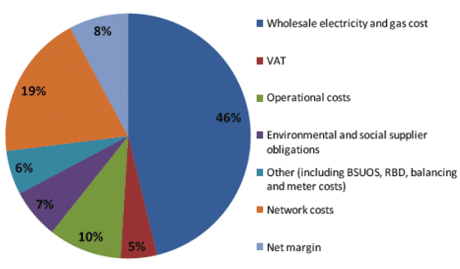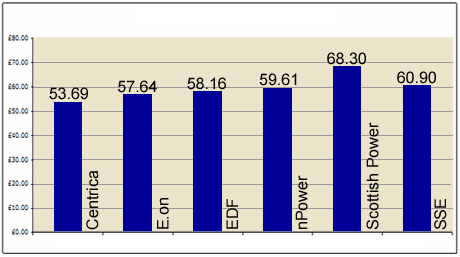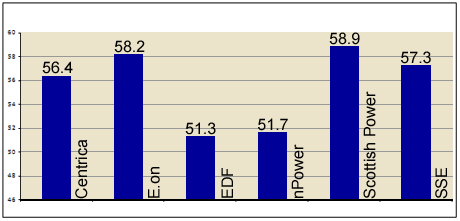Competition in the energy market is failing – bring back regulation
Opening the energy market to competition has failed to deliver a fair deal to consumers, says Phil Oakley. It's time to bring back regulation.
Get the latest financial news, insights and expert analysis from our award-winning MoneyWeek team, to help you understand what really matters when it comes to your finances.
You are now subscribed
Your newsletter sign-up was successful
Want to add more newsletters?

Twice daily
MoneyWeek
Get the latest financial news, insights and expert analysis from our award-winning MoneyWeek team, to help you understand what really matters when it comes to your finances.

Four times a week
Look After My Bills
Sign up to our free money-saving newsletter, filled with the latest news and expert advice to help you find the best tips and deals for managing your bills. Start saving today!
Lots of us are trying to save money at the moment. One tip that's regularly churned out in the papers is that you should get on to a price comparison website and change your energy supplier.
But how helpful is this tip really? The chances are that if you already buy your gas and electricity from the same supplier, pay by monthly direct debit and have an online tariff, you won't save huge amounts of money by switching.
Why? Because competition in the energy market simply doesn't work.
MoneyWeek
Subscribe to MoneyWeek today and get your first six magazine issues absolutely FREE

Sign up to Money Morning
Don't miss the latest investment and personal finances news, market analysis, plus money-saving tips with our free twice-daily newsletter
Don't miss the latest investment and personal finances news, market analysis, plus money-saving tips with our free twice-daily newsletter
Why competition doesn't work
Remember the days when you bought your gas from British Gas and your electricity from the local electricity board? Things were much simpler then.
No chopping and changing to get the best deal. Prices were regulated so that consumers didn't have to worry about firms profiteering at their expense.
Then, during the late 1990s, the government decided that competition could do a better job than regulation. Market forces would keep energy companies in check. The consumer would be the winner.
It might have sounded like a smart idea at the time. But since then, the market has largely been carved up among six big players Centrica, E.ON, EDF, nPower, Scottish Power and SSE. And any evidence that competition has benefited consumers is pretty thin on the ground.
We now have an energy market that is too complicated, with too many different tariffs fixed, capped, online, duel fuel etc. - making comparisons between suppliers very difficult.
Regulator Ofgem is looking into this, and promises much simpler pricing in future. That's welcome news, but it's unlikely to make any of us better off.
What's the problem? The real issue is that very few, if any, of the big energy suppliers have a sustainable cost advantage that allows them to be consistently cheaper than others.
The chart below shows how your standard duel fuel energy bill (currently averaging £1,335 per year) is made up.
How your duel-fuel energy bill is made up

Source: Ofgem
As you can see, just under half of your bill is related to the cost your supplier pays for electricity and gas the wholesale gas or electricity cost. Most of the other components of the bill are the same for whoever supplies you, with the exception of the profit margin.
So, is any energy supplier able to buy electricity and/or gas cheaper than its competitors? If not, and most of them are paying the same price, then what's the point of competition?
This is not an easy question to answer, but Ofgem is trying to shed some light on the issues.
All big six energy suppliers have been asked by Ofgem to provide details on their costs and profits. The cost of electricity is largely related to the cost of the fuel used to generate it gas, coal, oil, nuclear and renewables such as wind, biomass and hydro-electric. There is also a specific cost for emitting carbon dioxide with fuels such as coal costing the most.
Big six cost of electricity 2010/11 (£/Mwh)

Source: Ofgem
As the chart above shows, with the exception of Scottish Power, there was not much difference between the costs incurred by all the major suppliers.
But this doesn't tell the whole story. Companies source their electricity for different time periods at different costs. Sometimes it benefits them, other times it doesn't.
Also, most of the big suppliers also have their own power stations. This means they can decide to some extent where to allocate costs and take their profits.
For example, if a company wanted to make more profit from its power stations, it could charge its supply business more for electricity and lower the profits for that business - Scottish Power's domestic electricity business made a loss in 2010, for example. It is also possible to allocate costs and prices between domestic and business users of electricity.
It's a similar story for gas, as the chart below shows.
Big six cost of gas (pence/therm)

Source: Ofgem
Why do prices rise at the same time?
That's not to say that some firms don't have some advantages from time to time. The profits of generation companies are mainly due to the difference between power prices and the cost of the fuels used to generate electricity (known as spreads).
Sometimes gas is cheaper than coal and vice versa. So it's possible for the profits of some generators to be temporarily boosted, which can be used to lower prices to retail customers.
For example, the direct fuel costs of nuclear power are very low, which may give EDF Britain's biggest nuclear generator a competitive advantage, especially when power prices are high. For example it could use these profits to cut its retail prices and win new customers.
So why do the big six all tend to increase and cut prices at the same time? Does it means they are acting as a cartel? Or do they face similar costs?
Clearly the wholesale cost of gas is a big factor. About 35% of the country's electricity is generated from gas, so it makes sense that electricity and gas prices change when the gas price changes.
But if all the energy suppliers face similar costs, then how does competition help consumers? It's not as though customer service is a hugely important aspect of power provision. Price is surely the main driver of demand.
All that competition really means is that consumers have to be constantly chopping and changing suppliers trying to get the best deal and not knowing if they have. We suspect that if you net it out, you end up with a lot of hassle and stress (and the inevitable problems with companies failing to change your details properly when you change over) for very little gain.
A return to regulation might help us keep the lights on
The price we pay for water is regulated. Electricity and gas transmission (the national grid) and electricity and gas distribution are too. Why are electricity generation and supply exempt?
I'm all for competition but only when it benefits consumers. I'm not sure this is the case with energy supply. Although there would be complications with breaking up the market and re-regulating it, regulation of energy supply worked in the past and can work again.
There is also a very strong argument for regulating power stations. Britain has a lot of old power stations that are currently quite profitable. Most new gas, nuclear and renewable technologies need much higher power prices to make them viable.
This is stifling investment and potentially storing up problems for the future. With so many coal and nuclear stations due to close during the next decade, can we keep the lights on?
By giving generators a secure, regulated return, new investment can be encouraged. The higher costs of new stations and of fuels such as gas mean we will all be paying more for our energy in the future, regardless of what happens. But at least with a regulated market, the lights will stay on and we'll know we're getting a fair deal. That's not the case at the moment.
Get the latest financial news, insights and expert analysis from our award-winning MoneyWeek team, to help you understand what really matters when it comes to your finances.
Phil spent 13 years as an investment analyst for both stockbroking and fund management companies.
-
 New PM Sanae Takaichi has a mandate and a plan to boost Japan's economy
New PM Sanae Takaichi has a mandate and a plan to boost Japan's economyOpinion Markets applauded new prime minister Sanae Takaichi’s victory – and Japan's economy and stockmarket have further to climb, says Merryn Somerset Webb
-
 Plan 2 student loans: a tax on aspiration?
Plan 2 student loans: a tax on aspiration?The Plan 2 student loan system is not only unfair, but introduces perverse incentives that act as a brake on growth and productivity. Change is overdue, says Simon Wilson